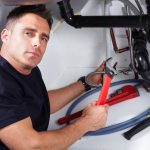
Simple Rules for Learning Plumbing
If you’re thinking of becoming a plumber, there are some simple rules you need to follow. These include the work environment, required qualifications, and timeliness. If you follow these rules, you can be on your way to a successful plumbing career. But how do you go about becoming a plumber?
Table of Content
Follow Basic Rules
Plumbing is a gratifying and profitable career. However, you should follow a few basic rules when preparing to learn the trade. First, be prepared to work in a variety of environments. Plumbers are often exposed to chemicals and bacteria. In addition, they must be cautious when working in confined spaces and at heights. Finally, plumbers must follow safety protocols and be vigilant to avoid injuries and accidents. After all, plumbing clients expect their jobs to be done right.
Mechanical Aptitude
Another essential skill to have in plumbing is mechanical aptitude. Plumbers are often required to take plumbing systems apart to determine what is wrong and repair it. Therefore, they must have an analytical mind and good hand-eye coordination. They must also be able to work with tools and feel for “sweet spots” in a particular material.
Required Qualifications
Before becoming a plumber, obtaining the proper training and certification is essential. In addition, most states and localities require plumbers to have a license. Each state has different requirements, but they all typically require a few years of experience and a plumbing examination. Some states also require a separate appointment for working with gas lines. Having a license, however, does not necessarily mean that a plumber can work independently. It does, however, mean that they must be supervised.
While plumbing does not require a college degree, it is highly recommended that you have at least a high school diploma. In addition to this, you should have basic math and algebra skills. Also, you should be in good physical health to carry out your job duties.
Work environment
A career as a plumber can be challenging, but it can also be rewarding. Plumbers in Albuquerque typically work in commercial or residential settings, installing plumbing and water systems. They develop their skills through training, on-the-job training, and educational programs. Depending on the position, they may also specialize in certain areas. For example, those who pursue advanced education in a related field, such as engineering, may be able to move up to the project manager or senior engineer position.
Plumbers must be physically strong and able to prioritize projects. They may also work in small, dark spaces and under extreme temperatures. In addition, they must communicate effectively with clients, supervisors, contractors, and subcontractors. They also need to solve problems quickly, which requires a robust problem-solving skillset.
Timeliness
A career as a plumber requires an aptitude for physical strength and mental endurance. In addition to working in cramped, dark places, plumbers must also be able to communicate professionally with clients, supervisors, and contractors. They also need to be able to handle a variety of administrative tasks. Organizational skills are also necessary, as plumbers often work under extreme conditions.
One of the most common routes to learning plumbing skills is through an apprenticeship program. These programs are usually sponsored by local unions, companies, or contractors. They typically last four to five years and combine classroom instruction with hands-on experience.
Safety
Plumbing can be dangerous, and learning plumbers should adhere to several safety rules. For instance, they should wear safety goggles and keep a first aid kit handy when working on a plumbing job. Plumbers should also keep a close eye on their tools. When using new equipment, they should test it to make sure that it is safe to use. When working with utility pipes, they should be extra cautious as they can come into contact with bare wires.
The first safety rule for plumbers is to wear protective gear. Plumbers are exposed to various dangerous materials, so they must wear gloves and face masks. The gloves should be made of heat-insulating material. This is important because plumbers often work around steam lines or hot equipment. This can cause them to burn their hands. Plumbers should also be careful to drain pipes before they begin work.
Flexibility
A plumber must possess both physical and mental flexibility, as they must be able to reach tight places. They also need good eyesight and the ability to see in dim lighting. They must also be physically fit and strong enough to carry heavy pipes and equipment. Finally, they must also have good organizational skills.
Flexible plumbing schedules allow plumbers to meet the needs of their customers. For example, they may spend some time in the office and other time with customers. Using scheduling software will help plumbers maximize their flexibility. This software lets customers and employees specify their availability, which can help plumbers avoid scheduling conflicts. In addition, they can use the software to schedule appointments with customers. This way, they can see exactly which time slots are open and if any are reserved for emergency services.


